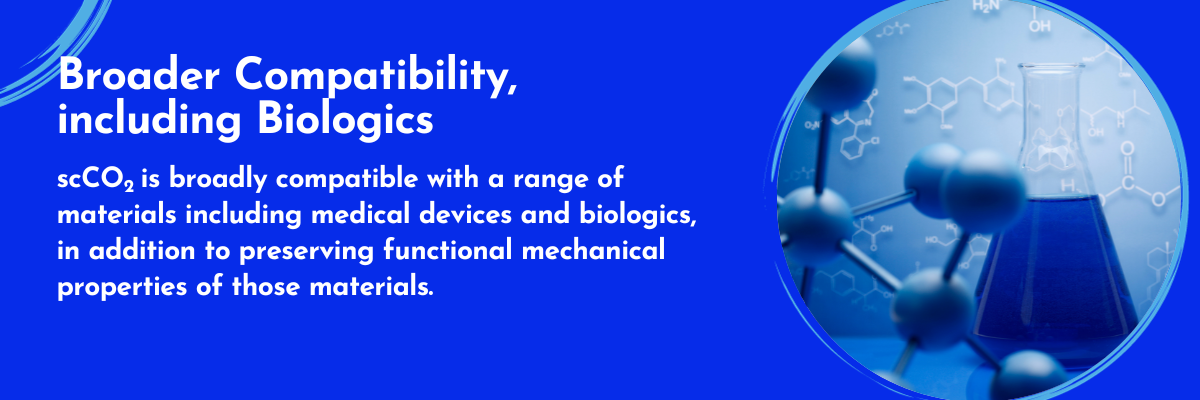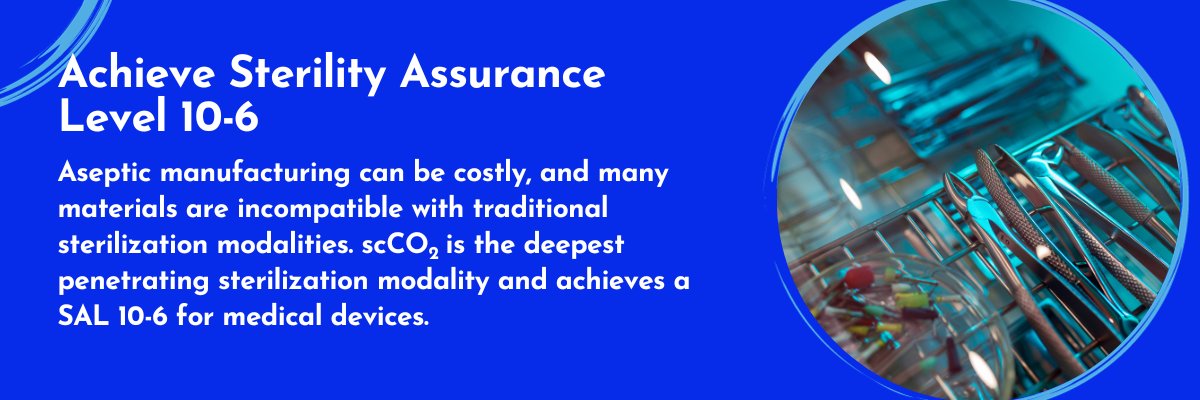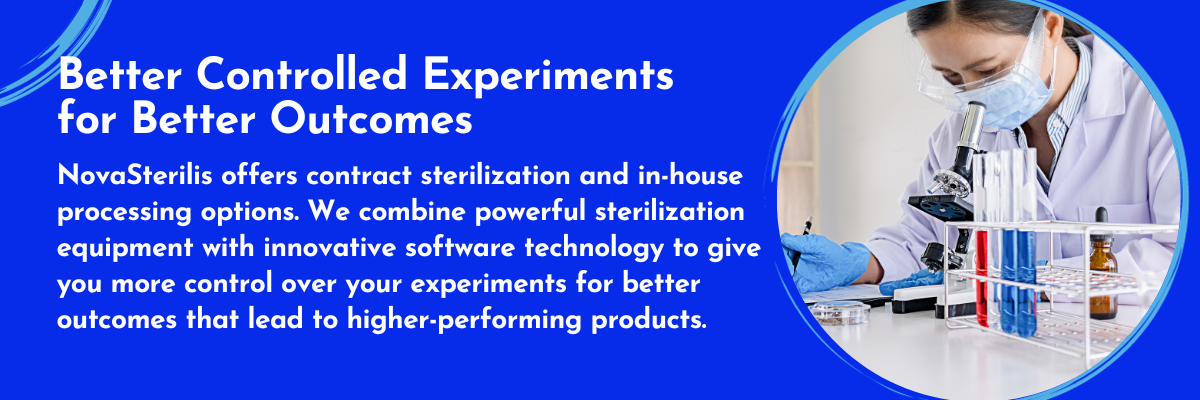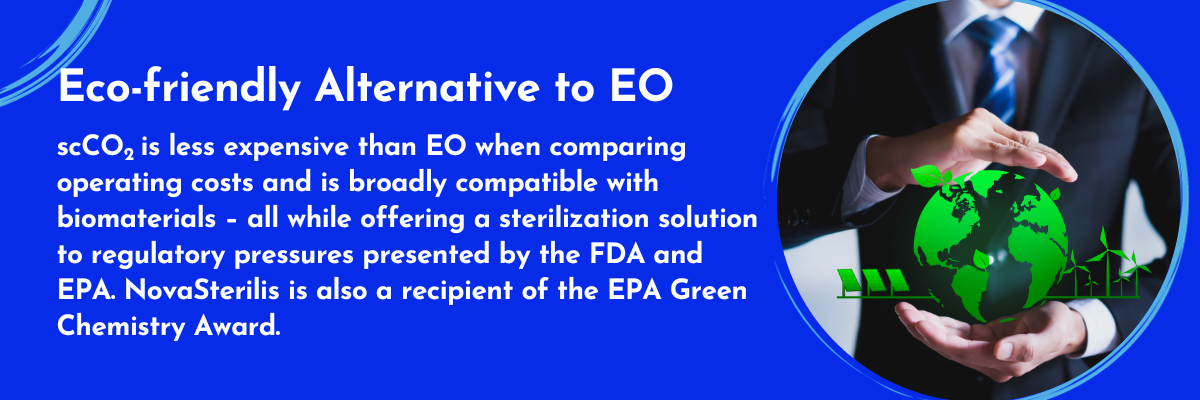The regenerative medicine industry is an ever-expanding market. Traditional sterilization methods often fall short of meeting researchers’ and the markets’ needs. As the regenerative medicine field moves closer to the ability to mimic the human body’s natural healing process, the need for a sterilization method that is both gentle AND preserves proteins, growth factors, carbohydrates, and enzyme activity is essential.
NovaSterilis’ scCO2 equipment platforms are currently being used on a variety of biomaterials. In addition to sterilization, scCO2 possesses cleaning and decellularization capabilities that produce an extremely clean, mechanically superior, biomaterial that surgeons prefer. The Nova Process has long served as a solution for cleaning and sterilizing many types of allograft and xenograft tissues, including skin, ligament, tendon, and bone.
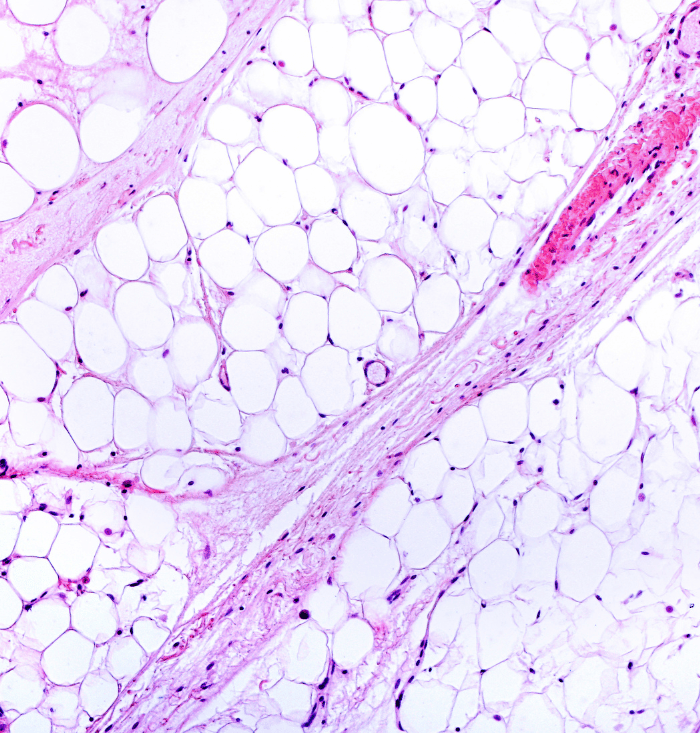
NovaSterilis’ terminal sterilization process achieves a medical device industry standard of SAL6 with minimal to no impact on the tissue being processed. The NovaSterilis process is a terminal sterilization process, and the product is processed in multi-layer gas-permeable sealed packaging.

NovaSterilis Advantages:
scCO2 is broadly compatible with natural and synthetic materials.
Supercritical CO2 is the deepest penetrating sterilization method currently on the market.
scCO2 effectively decellularizes xenograft and allograft materials while preserving the native structure of the ECM, which helps promote healing and recellularization though the scaffold.
scCO2 possesses excellent solvent and cleaning capabilities and has been incorporated into NovaSterilis’ cleaning process to extract embedded lipids and organic material, leaving tissue cleaner than many other cleaning processes.
Tissue Sterilization in Regenerative Medicine
NovaSterilis understands the specific regulatory requirements surrounding regenerative medicine. We offer contract sterilization services, in addition to scCO2 sterilization equipment, to accommodate these valuable products.
Every year, doctors transplant over 2,000,000 allograft tissues. In most cases, with the exception of amniotic membrane, allograft tissue is obtained through a donation after a person’s death. These tissues and organs provide lifesaving benefits, and we believe that the selfless act of donation is best honored if the tissue maintains all of its natural characteristics yet offers no risk of infection to the recipient.
The gentle nature of the Nova Process allows tissue to be rendered sterile, in final packaging, with little or no effect on the biologic or biomechanical properties of the allograft tissue. There is growing evidence based on over eight years of commercial use that NovaSterilis sterilized grafts are not only the highest quality sterile grafts available, but they also readily incorporate with less immune response.
Please visit our publications page for a list of papers highlighting the benefits of NovaSterilis’ scCO2 process.
One of the fastest growing biomaterials used in regenerative medicine is xenograft tissue. These tissues originate from bovine, equine, ovine or porcine and are supplied in many different forms including powders, sheets, tubes, and gels, all of which are chosen to meet highly specific needs.
Applications of xenografts include, but is not limited to; acellular dermis, bovine and porcine pericardium, fascia, porcine small intestine submucosa, bladder, heart valves, and pure collagen.
Acellular dermis has a long history of abdominal wall repair, but the product is also used for breast reconstruction and plastic surgery. Porcine small intestine submucosa (SIS) is widely applied in surgery and regenerative medicine with applications ranging from wound care to cardiac repair. Since many of these products are primarily used as surgical implants, sterilization is extremely important to protect patients and ensure successful surgical outcomes.
Current research is focused on biologic additives to or native nucleic acid-based constituents in xenografts, which enhance patient recover times and outcomes. As researchers continue to fine tune material properties and explore the mechanism by which these materials work, it is clear that sterilization with ethylene oxide, steam, and radiation negatively impacts patient outcomes. Multiple papers have shown that scCO2 processing is superior for many of these materials.
NovaSterilis is your partner in producing a product that most closely matches the native material, so you don’t have to decide between sterilization and performance. Contact our team via email or online form to discuss your needs.
NovaSterilis understands the specific and regulatory requirements surrounding tissue engineering and sterilization. We offer contract sterilization services, in addition to scCO2 sterilization equipment, to accommodate these valuable products.
Historically, most tissue products have been aseptically processed in the local tissue recovery site; however, tissue banks and manufacturers have recently begun seeking terminal sterilization solutions due to increased regulatory scrutiny, as well as the desire for cleaner, safer products and improved performance.
Differentiating your tissue products from your competitors can be difficult when a similar cleaning and sterilization process is being followed. Supercritical CO2 disrupts this with a gentle, low-temp, broadly compatible sterilization methods making it easier for your product to standout and maintain market share.
Advantages of scCO2 for Tissue Engineering:
- scCO2 causes significantly less cross-linking, unlike traditional radiation sterilization, which leaves the tissue functional and closer to its native state.
- scCO2 achieves terminal sterilization while preserving the biocompatibility of allografts.
- scCO2 cleaning, dilapidation, decellularization and/or sterilization can be done in-house, which is less expensive than outsourced gamma sterilization
- scCO2 achieves terminal sterilization while preserving the biocompatibility of allografts.
- The Nova Process combined with scCO2 kills spores.
- Chemical/Antibiotic washes have utility in the manufacturing process,, but they do not achieve the levels of safety found with terminal sterilization. A safer, gentler method that does not impact tissue performance.
Contact our team via email or online form to discuss your needs and possible scCO2 applications.
Why NovaSterilis:
